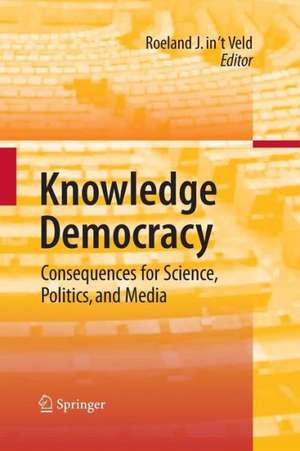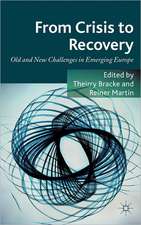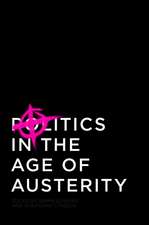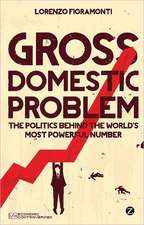Knowledge Democracy: Consequences for Science, Politics, and Media
Editat de Roel in 't Velden Limba Engleză Paperback – 7 oct 2014
| Toate formatele și edițiile | Preț | Express |
|---|---|---|
| Paperback (1) | 895.01 lei 38-44 zile | |
| Springer Berlin, Heidelberg – 7 oct 2014 | 895.01 lei 38-44 zile | |
| Hardback (1) | 902.20 lei 38-44 zile | |
| Springer Berlin, Heidelberg – 11 mar 2010 | 902.20 lei 38-44 zile |
Preț: 895.01 lei
Preț vechi: 1177.65 lei
-24% Nou
Puncte Express: 1343
Preț estimativ în valută:
171.25€ • 178.82$ • 141.42£
171.25€ • 178.82$ • 141.42£
Carte tipărită la comandă
Livrare economică 11-17 aprilie
Preluare comenzi: 021 569.72.76
Specificații
ISBN-13: 9783642424595
ISBN-10: 3642424597
Pagini: 416
Ilustrații: XVI, 397 p.
Dimensiuni: 155 x 235 x 22 mm
Greutate: 0.58 kg
Ediția:2010
Editura: Springer Berlin, Heidelberg
Colecția Springer
Locul publicării:Berlin, Heidelberg, Germany
ISBN-10: 3642424597
Pagini: 416
Ilustrații: XVI, 397 p.
Dimensiuni: 155 x 235 x 22 mm
Greutate: 0.58 kg
Ediția:2010
Editura: Springer Berlin, Heidelberg
Colecția Springer
Locul publicării:Berlin, Heidelberg, Germany
Public țintă
ResearchCuprins
Towards Knowledge Democracy.- The harvest of the #x201C;Towards Knowledge Democracy#x201D; conference.- Heads in the clouds: knowledge democracy as a Utopian dream.- Dreaming about a properly informed democracy.- One Man #x2013; One Vote #x2013; One Carbon Footprint: Knowledge for Sustainable Development.- Unlocking the full potential of the crowd #x2013; a government perspective.- Researching publics.- Relevant Research in a Knowledge Democracy: Citizens#x2019; Participation in Defining Research Agendas for Europe.- Why more knowledge could thwart democracy: configurations and fixations in the Dutch mega-stables debate.- Media, Democracy and Governance.- How can transdisciplinary research contribute to knowledge democracy?.- Knowledge synchronisation: interactive knowledge production between experts, bureaucrats and stakeholders.- From #x201C;knowledge use#x201D; towards #x201C;boundary work#x201D;: sketch of an emerging new agenda for inquiry into science-policy interaction.- The public knowledge challenge: where the management of cities and businesses converge towards creativity, innovation and prosperity.- The governance of usable and welcome knowledge, two perspectives.- Horizon scanning: monitoring plausible and desirable futures.- Four steps to stimulate meaningful communication on sensitive issues in societal debate: the case of a research agenda for biotechnology and food in the Netherlands.- Sustainable development and the governance of long-term decisions.- Knowledge governance: complementing hierarchies, networks and markets?.- The positioning of commissions in a knowledge democracy.- Knowledge exchange through online political networks.- Designing the conditions for an innovation system for sustainable development in a knowledge democracy.
Textul de pe ultima copertă
Knowledge democracy is an emerging concept that addresses the relationships between knowledge production and dissemination, as well as the functions of the media and democratic institutions. Although democracy has been the most successful concept of governance for societies for the last two centuries, representative democracy, which became the hallmark of advanced nation-states, seems to be in decline. Media politics is an important factor in the downfall of the original meaning of representation, yet more direct forms of democracy have not yet found an institutional embedding. Further, the Internet has also drastically changed the rules of the game, and a better educated public has broad access to information, selects for itself which types to examine, and ignores media filters. Some citizens have even become "media" themselves. In a time where the political agendas are filled with combatting so-called evils, new designs for the relationships between science, politics and media are needed. This book outlines the challenges entailed in pursuing a vital knowledge democracy.
Caracteristici
The contributions by scholars and practitioners and the comprehensive analysis by the editor aim at setting an agenda for further debate, research and design, towards a vital knowledge democracy. Includes supplementary material: sn.pub/extras














